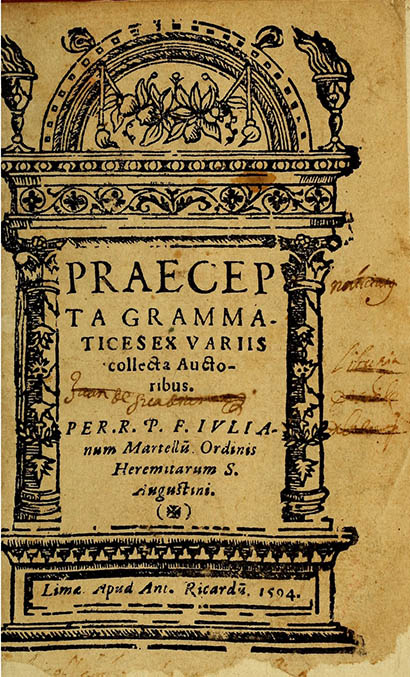
Libraries
Libraries
Praecepta grammatices ex variis collecta auctoribus
Praecepta grammatices is the only known printed work of the Augustinian father Julián Martel, whose biography is known thanks to the work of his coreligionist, Bernardo de Torres. Martel was born in Granada to noble parents: Miguel Martel and Inés Flores. From an early age, he felt inclinations both for the Letters and for the religious life. After becoming a priest, he decided to venture to Peru to save the souls of idolaters. He arrived in Chuquisaca where he carefully learned the Aymara language. The then bishop of Charcas granted him a benefit in a town in the province of El Collao. There he was in charge of a church for several years until he returned to Spain, to the Carthusian Convent. After a time, he felt the call to enter the Order of the Augustinians. This is how he returned to the Kingdoms of Peru in 1573. In the Augustinian convent of Lima he held various positions: he was master of novices and later, prior. His exemplary life has been reviewed by Torres, who comments that he was considered a saint and venerated in his death by the entire city of Los Reyes de Lima. His friend, the Jesuit Juan Sebastián, rector of the Society of Jesus, was in charge of his funeral services and, apparently according to the first edition of Torres’s work, led the process for his beatification to Rome: Martel’s body was stripped of his garments and part of his hair by a crowd that acclaimed him a saint.
Apparently, he composed his treatise Praecepta grammatices shortly before returning to Spain, during his first stay in Peru. His penchant for Literature and Theology perhaps led to his desire to compose a manual that includes both grammar and a glossary of terms and another of phrases that would make it easier for lay people to speak in Latin. The cover of the volume is unique: rare are, in the sixteenth century, those that have a front. This sign reveals the care with which the volume was printed by Antonio Ricardo. There is news of a spiritual work by Martel, entitled Desengaño de la vida humana, admired by distinguished political and ecclesiastical figures of his century, now lost.

